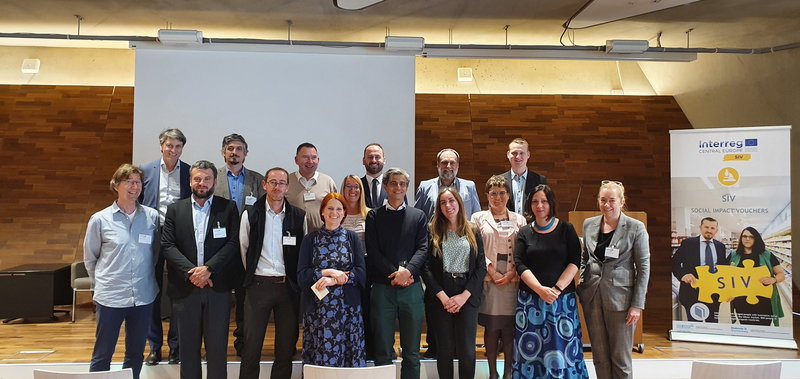Report on the Interreg SIV Policy & Practice Conference "Social Impact Vouchers as a Tool for Social Innovation on the Labour Market" on 03 May 2022
What role can private donors play in the fight against unemployment? This question was the focus of the Policy & Practice Conference at WU Vienna on May 03, 2022. The conference marked the conclusion of the Interreg project "Social Impact Vouchers" (SIV). Within the framework of the project, eleven partners from eight Central European countries have developed voucher models for different vulnerable groups affected by unemployment over the last three years and tried to find private donors to participate in the funding. The conference served to present results and experiences and to reflect on them together with various experts.
Marta Kahancová, Executive Director of the Central Europe Labour Studies Institute (CELSI) highlighted societal developments that pose major challenges for the European labour market in her presentation. These are for instance aging, structural shifts in the labour market due to digitalization and the greening of the economy, migration and integration especially in the wake of refugee movements, as well as the risk of poverty, which is currently strongly exacerbated by inflation and rising energy prices. Vulnerability occurs along various socio-demographic characteristics (women, elderly, youth, etc.), but is also influenced by the type of connection to the labour market (e.g. self-employment, people with multiple employment contracts). Addressing the consequences of these developments requires innovative approaches, the interaction of all stakeholders involved and clear policy frameworks.
In his presentation, Michael Fembek, head of the Zero Project founded by the Essl Foundation, described experiences with promoting the employment of people with disabilities and questioned - quite critically - the role that private non-profit foundations can play there. The Zero Project is making a significant contribution to strengthening the ecosystem around the topic of employment for people with disabilities internationally, as he impressively demonstrated with a number of innovative examples. However, if one looks at the amount of financial resources behind it, it becomes clear that these are very small in relation to public funding. The decisive factor, however, is cooperation, because it is not a matter of substituting public measures, but of finding innovative approaches. Foundations could make a significant contribution where it was a matter of trying out new things, even at the risk of failure. As an example, he mentioned the Social Impact Bond, which was carried out for the first time in Austria in 2015 for the benefit of the Violence Protection Center Upper Austria, Women's Shelter Linz.
In the panel discussion that followed, Christian Grünhaus, scientific director of the NPO Competence Center at WU Vienna, invited the two above mentioned speakers as well as Iva Tsolova, co-founder of the social enterprise JAMBA as well as Julian Hiebl, responsible for international affairs at AMS, to delve deeper into the topic. Iva Tsolova described how COVID-19 helped convert their IT training program for people with disabilities/chronic illnesses to an online format, which allowed the program to scale significantly and is now available to many more affected individuals. Julian Hiebl reported on the European Network of Public Employment Services (PES), which is committed to an intensive exchange with the clear aim of improving the quality of employment services in the individual countries. In the discussion, the importance of cooperation between public and private stakeholders to address the challenges in the labour market was once again emphasized.
In the afternoon, the partners presented the SIV project in three breakout sessions. One of them dealt with the voucher models in the participating countries. Voucher benefits include training, placement assistance or finance labour costs for a specific period. In a second breakout session, fund models were presented. In addition to public funds, the partners primarily addressed philanthropic donors. The models do not provide monetary returns to funders, but portions of the funds used are intended to be returned to the funds through success fees. The third breakout session focused on impact measurement. In the course of the project, the NPO Competence Center conducted a social return on investment (SROI) analysis for a project partner (Diakonie Württemberg), where the church has been funding vouchers for long-term unemployed persons over several years. The approach of the impact analysis as well as results were presented. Furthermore, it was discussed to what extent the results of the SROI analysis were used and where they were helpful.
Finally, the project partners presented important lessons learned and recommendations for action. In the participating countries, the fight against unemployment is very much perceived as a task of the state. So far, there are hardly any business models that make this topic interesting for impact investors. The first steps in this regard are social impact bonds. Attracting philanthropic donors, on the other hand, requires a lot of relationship building, which was very difficult during the COVID-19 phase due to the many restrictions. Legal hurdles were also evident in the establishment of a transnational fund, in part because the tax framework for cross-border donations is not yet well regulated. In view of developments in the labour market and associated social challenges, it is necessary for private and public stakeholders to cooperate and develop innovative solutions in order to continue to combat poverty and exclusion in the future.
More information on the conference: https://short.wu.ac.at/interreg-siv-conference-03may22
Contact:
Flavia-Elvira Bogorin, MSc
Researcherin
Kompetenzzentrum für Nonprofit Organisationen und Social Entrepreneurship
Competence Center for Nonprofit Organisations and Social Entrepreneurship
WU
Wirtschaftsuniversität Wien
Vienna University of Economics and Business
Gebäude AR, 1. OG
Welthandelsplatz 1
1020 Wien
Tel: + 43 1 313 36 / 5818
Email: flavia-elvira.bogorin@wu.ac.at
www.wu.ac.at/npocompetence

